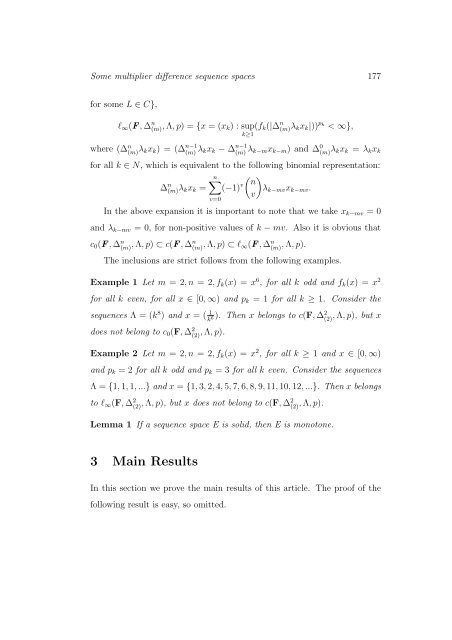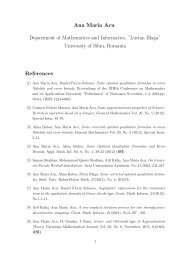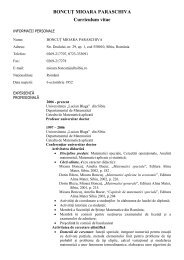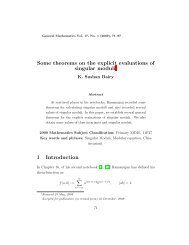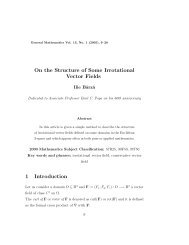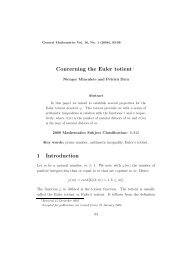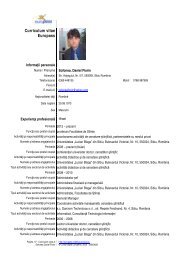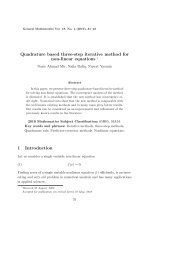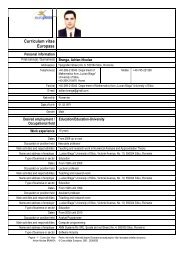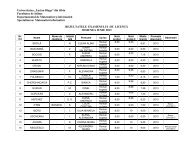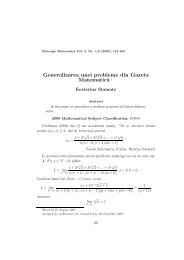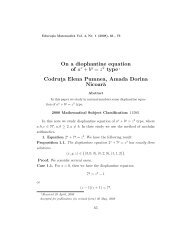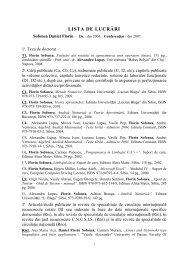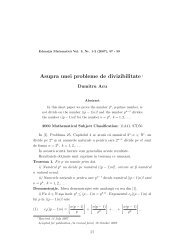Some multiplier difference sequence spaces defined by a sequence ...
Some multiplier difference sequence spaces defined by a sequence ...
Some multiplier difference sequence spaces defined by a sequence ...
You also want an ePaper? Increase the reach of your titles
YUMPU automatically turns print PDFs into web optimized ePapers that Google loves.
<strong>Some</strong> <strong>multiplier</strong> <strong>difference</strong> <strong>sequence</strong> <strong>spaces</strong> 177for some L ∈ C},l ∞ (F , ∆ n (m), Λ, p) = {x = (x k ) : sup(f k (|∆ n (m)λ k x k |)) p k< ∞},k≥1where (∆ n (m) λ kx k ) = (∆ n−1(m) λ kx k − ∆ n−1(m) λ k−mx k−m ) and ∆ 0 (m) λ kx k = λ k x kfor all k ∈ N, which is equivalent to the following binomial representation:n∑( ) n∆ n (m)λ k x k = (−1) v λ k−mv x k−mv .vv=0In the above expansion it is important to note that we take x k−mv = 0and λ k−mv = 0, for non-positive values of k − mv. Also it is obvious thatc 0 (F , ∆ n (m) , Λ, p) ⊂ c(F , ∆n (m) , Λ, p) ⊂ l ∞(F , ∆ n (m), Λ, p).The inclusions are strict follows from the following examples.Example 1 Let m = 2, n = 2, f k (x) = x 6 , for all k odd and f k (x) = x 2for all k even, for all x ∈ [0, ∞) and p k = 1 for all k ≥ 1. Consider the<strong>sequence</strong>s Λ = (k 8 ) and x = ( 1 ). Then x belongs to c(F, ∆ 2 k 6 (2), Λ, p), but xdoes not belong to c 0 (F, ∆ 2 (2), Λ, p).Example 2 Let m = 2, n = 2, f k (x) = x 2 , for all k ≥ 1 and x ∈ [0, ∞)and p k = 2 for all k odd and p k = 3 for all k even. Consider the <strong>sequence</strong>sΛ = {1, 1, 1, ...} and x = {1, 3, 2, 4, 5, 7, 6, 8, 9, 11, 10, 12, ...}. Then x belongsto l ∞ (F, ∆ 2 (2) , Λ, p), but x does not belong to c(F, ∆2 (2), Λ, p).Lemma 1 If a <strong>sequence</strong> space E is solid, then E is monotone.3 Main ResultsIn this section we prove the main results of this article. The proof of thefollowing result is easy, so omitted.


